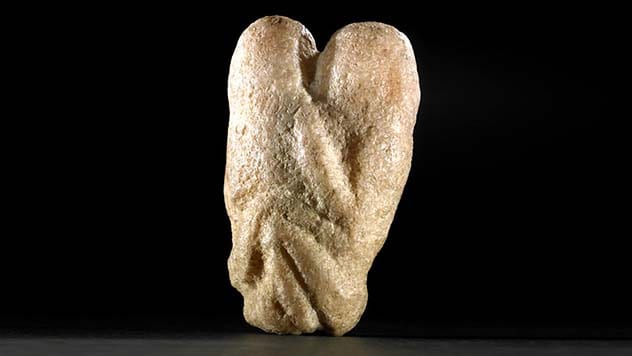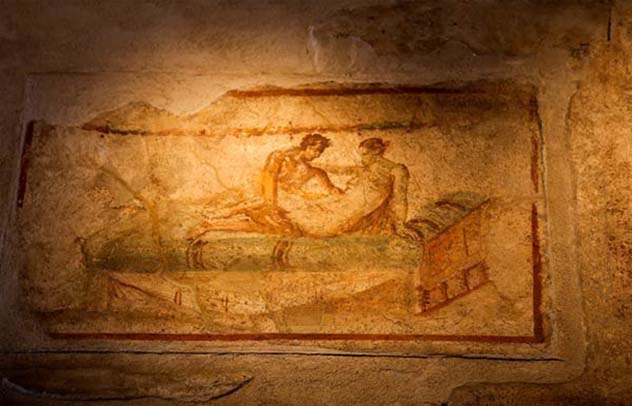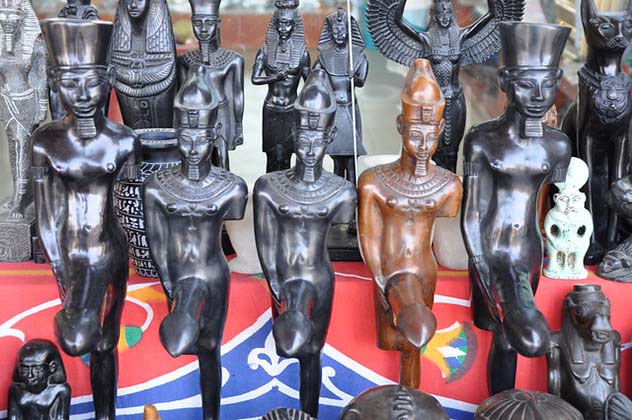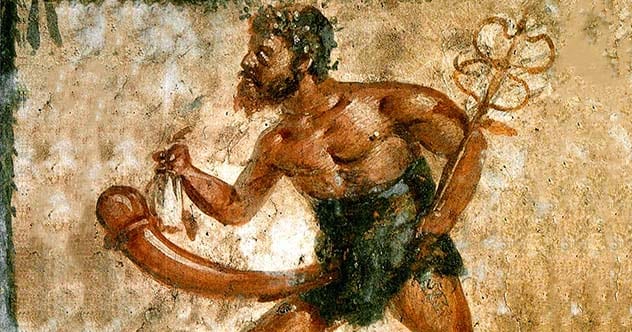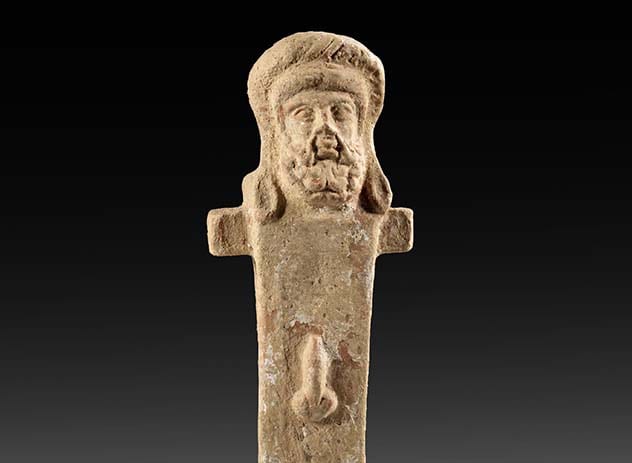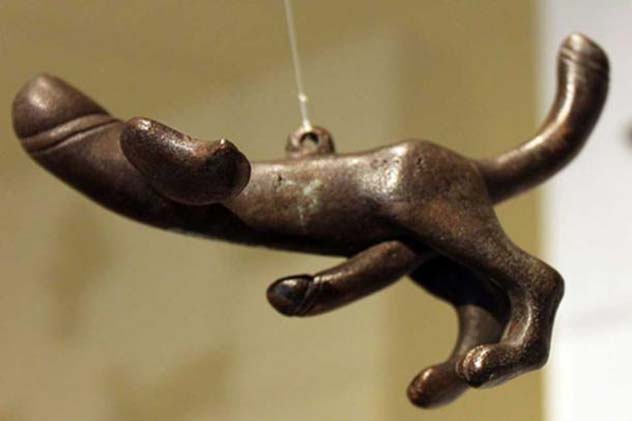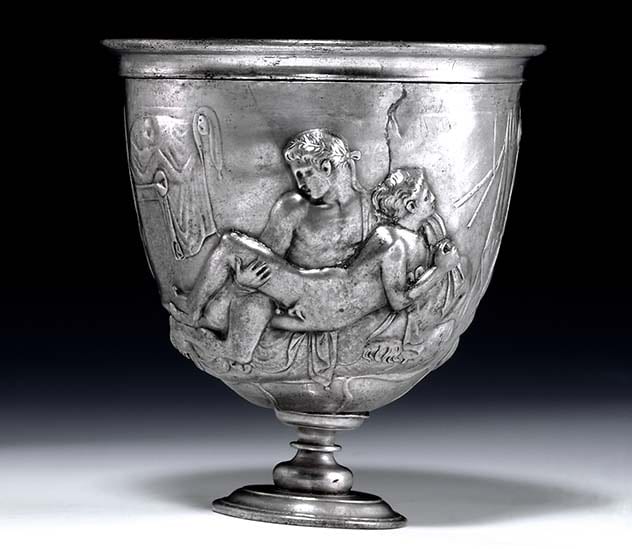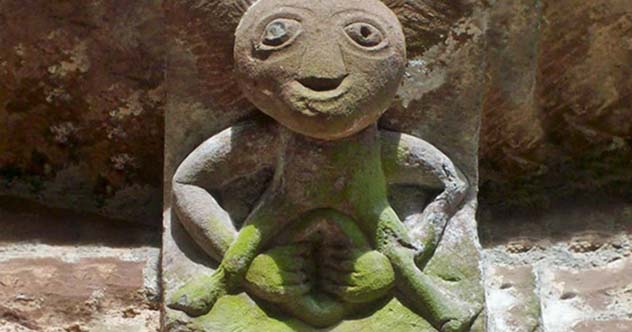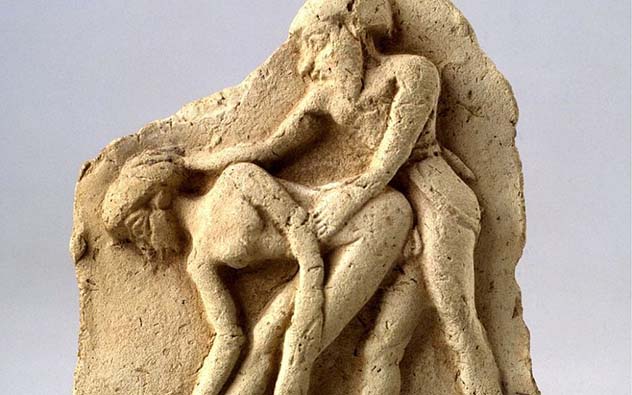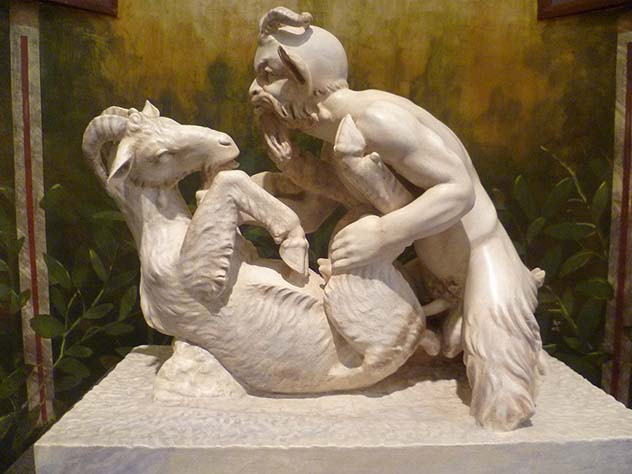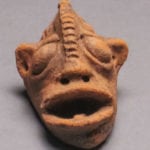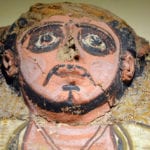When artefacts were excavated in the past they were often suppressed if they did not fit the cultivated image people had of the ancient world. It can therefore be a shock when we are confronted with the naughty, erotic, or frankly bizarre sexual imagery that our ancestors reveled in. Here are ten of the most shocking pieces of erotic art from the deep past. SEE ALSO: 10 Sex Myths We All Believe
10 Ain Sakhri Lovers
The oldest image we have of two people having intercourse comes from 11,000 years ago. Currently held in the British Museum, the Ain Sakhri Lovers were discovered in a cave near Bethlehem. The 10cm tall statue is thought to come from the Natufian Culture of the ancient middle east. While at first it merely looks like a crude piece of carving it is in fact a clever work of art. The person who created the Lovers used a stone tool to pick out the details. When viewed from the side it is unmistakably a pair with their legs wrapped around each other during sex. But without facial features on either figure it gives their heads a somewhat phallic appearance. This resemblance to a penis continues if the statue is turned sideways. From different angles the Lovers can also appear as a pair of breasts or dangling testicles. What the Lovers was originally intended for is unknown. As with any archaeological find it may well have had a ritual meaning, but it is also possible that our ancestors were like us and simply preferred their porn 3D.
9 Pompeii Brothel Pictures
Pompeii was a cosmopolitan port. From the graffiti found in the ruins of the town we know that visitors were speaking a variety of languages from Latin to Greek to Oscan and maybe Hebrew. With potential language barriers popping up how then was a prostitute to earn her living? When Vesuvius erupted it both destroyed and preserved Pompeii. Excavations have revealed exactly what Roman towns were like and one of the entertainments offered in Pompeii was a trip to a brothel. In the Lupinare, one of Pompeii’s pleasure houses, were a series of wall paintings showing couples in various sexual positions. It is thought that these images were used as a sort of sexual menu telling punters exactly what was on offer, in much the same way a picture of a hamburger helps a foreign tourist order in a restaurant.
8 Min
To describe something as ithyphallic is to say it has an erect penis. If you know anything about the Egyptian god Min it is that he is ithyphallic – his statues will not let you forget that fact. Min, an early god known as ‘the maker of gods and men,’ was among the first Egyptian deities to have large statues raised to them. Those statues did not attempt to hide his anatomy. He is often shown holding his penis in his left hand. At his cultic sites his sacred animal was usually a bull – animals known for their virility. When Min was linked to the constellation Orion the three famous stars in Orion’s midriff were definitely not representing a belt. Min was associated with a type of wild lettuce that when cut produces a thick, white sap. Some archaeologists have made claims about just what this sticky white fluid could have brought to the Egyptian mind.
7 Priapus
Having a big penis is generally thought to be lucky. For the Greeks and Romans however a large phallus was not only lucky in itself it was also a bringer of luck. Carvings of penises have been found at many ancient sites and one figure of mythology is particularly associated with them. Priapus is a fertility deity with a (to us) comically large penis who was thought to be helpful in farming, gardens, and anything you might consider using a penis for. Pompeii once again offers a great view of how sex was seen in the ancient world. Paintings and statues of Priapus are found all over the city. One famous fresco of Priapus shows him weighing his penis against a bag of gold, perhaps hinting at a role in business as well. Statues of the god often show him holding fruit in his robe which is lifted to reveal his erect penis beneath. We cannot be sure how exactly the Greeks and Romans viewed these images. Were they viewed with reverence or laughter? Perhaps the two were not separate things back then. Bear that in mind the next time someone laughs at your anatomy.
6 Herms
Herms in ancient Greece were a unique style of statuary. On top of a square pillar sat the head of either a human or a god. This much is fairly standard but around half way down the pillar was carved a set of male genitalia. The god Hermes was often the deity shown on a herm and he had a role in protecting borders and warding off thieves. It is thought that herms acted as guards in both private and public settings, as well as being general good luck charms. When the herms were attacked it was an attack on the whole city. In 415 BC the city of Athens awoke to find its herms had all been mutilated. A gang had torn through the streets during the night vandalizing them – probably by smashing off their penises. Suspicion for this sacrilegious act fell on the statesman Alcibiades and led to his downfall and banishment from the city. Luckily for him the law of “an eye for an eye” was not yet in vogue.
5 Tintinnabula
The penis was a lucky charm for the Romans but so were bells. It, therefore, made sense for them to hang bells from a phallus to increase the power of these charms. Called tintinnabula these wind chimes were hung from doorways and in gardens to ward off evil spirits. But simply mixing two charms together was not enough for the Romans. Some tintinnabula are a complex mix of imagery. The central figure might be an erect phallus with wings and a lion’s tail. This flying phallus might also be sporting an erect phallus of its own. Hanging from these conjoined penises could be bells or even other phalluses, with yet more bells attached.
4 Warren Cup
The Warren Cup, bought by the British Museum in 1999, is one of the finest pieces of Roman silver work in existence. It is also one of the most pornographic. Usually dated to the 1st century after the birth of Christ, the silver drinking vessel shows four figures in a heavily decorated room surrounded by musical instruments. These signs of luxury are not what catch the eye, however. On one side a pair of youthful men (“twinks”) are shown making love while on the other a young man or boy lowers himself into the lap of his older, bearded lover (or “daddy” in modern parlance). As if to underline our own role as voyeurs a fifth figure can just be seen peeping at the copulating couples from around the edge of a door. To show just how far tastes can change the Warren cup was refused entry into the United States in 1953 because the imagery on it was just too shocking.
3 Sheela na gig
When PJ Harvey sang a song called Sheela Na Gig, some listeners may not have understood what she may have been singing about. The lyrics include lines like: “Sheela-na-gig, Sheela-na-gig You exhibitionist Put money in your idle hole” So what is are sheela-na-gigs? They are statues with exaggerated vulvas that they are gleefully opening up to the world. They are often found on churches, which seems like the last place you would find an exhibitionist female statue. Most commonly found in Ireland and Britain sheela na gig-like sculptures can also be found in mainland Europe. When they appear on churches they are usually positioned over doorways or windows. It is as if the portal being opened by the statue is mirrored in the one below. No one knows exactly why these sculptures began appearing in the 11th century or what their purpose was. The best guess is that like other erotic figures they were used to ward off evil spirits and to keep them from entering the church, perhaps by offering a more tempting place for spirits to enter.
2 Babylonian copulating couples
Freud said “Sometimes a cigar is just a cigar.” When it comes to erotic art sometimes porn is just porn. This may be the case with the copulating couples of ancient Mesopotamia. From across millennia and locations in the middle east plaques and statues have emerged from the sands which show nothing other than couples in various acrobatic poses. Two famous plaques from Iraq that are nearly 4000-years-old are illustrative. One shows a man taking a woman from behind, apparently to the satisfaction of both. The other shows a couple in a similar position but with the pair taking a break from their exertions to have a refreshing drink. The lady sips up thick Babylonian beer through a straw while the man drinks from a cup. It has been theorized that these different drinking styles may relate to male and female oral sex. Here may be an example of a simple joyous reaction to sex from the ancient world untainted by any spiritual meaning. For the Mesopotamians it seems that sex was just sex and not something to be ashamed of. For us modern readers, however, it is absolutely shocking to see such a perverse and unashamed promotion of drinking straws.
1 Pan having sex with a goat
When an excavation in 1752 at Herculaneum (the other Roman town buried by the Vesuvius eruption) revealed a statue of the god Pan, the discoverers were left in a quandary. What do you do with a sculpture that plainly shows the half-human, half-goat deity penetrating a she-goat? One early viewer wrote home to say that the depiction was too indecent to describe and suggested that it should be tossed back into the volcano. Instead the sculpture was placed in a collection of other pieces of erotic art from the ancient Roman sites that could only be accessed by getting the permission of the King of Naples. Or by bribing a guard. Women were banned entirely from viewing the objects. For those desperate to see what all the fuss was about prints and drawings of the statue became available. The sculptor Joseph Nollekens created a terracotta copy from memory. Today however anyone paying the entrance fee to the Archaeological Museum in Naples can see it among the other artefacts in the ‘Secret Cabinet’ of ancient artworks once considered too filthy for the public.
